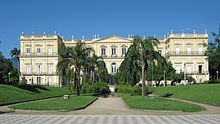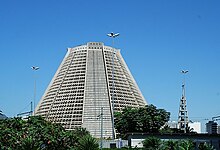Outline of Rio de Janeiro
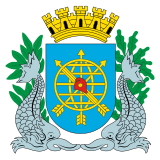
The following outline is provided as an overview of and topical guide to Rio de Janeiro:
Rio de Janeiro – capital and most populous city of Rio de Janeiro state, and the second most populous city in Brazil, Rio de Janeiro was founded in 1565 by the Portuguese as part of the Portuguese Empire. It was the capital and political center of Brazil, where events like the Proclamation of the Republic took place. Brasília overtook Rio de Janeiro as the new capital of Brazil in 1960. Rio de Janeiro is known for its cultural riches, such as Carnival, samba and bossa nova, beaches such as Copacabana and Ipanema, and also for the Christ the Redeemer statue overlooking the city. Major education institutions include the Federal University of Rio de Janeiro, the Rio de Janeiro State University, and Colégio Pedro II.
General reference[]
- Pronunciation: /ˈriːoʊ di ʒəˈnɛəroʊ, - deɪ -, - də -/ REE-oh dee zhə-NAIR-oh, - day -, - də -, Portuguese: [ˈʁi.u d(ʒi) ʒɐˈnejɾu] (
 listen)
listen) - Common English name(s): Rio de Janeiro
- Official English name(s): Rio de Janeiro
- Adjectival(s): Carioca
- Demonym(s): Carioca
Geography of Rio de Janeiro[]
Geography of Rio de Janeiro
- Rio de Janeiro is:
- a city
- capital of Rio de Janeiro (state)
- a city
- Population of Rio de Janeiro: 7,456,682
- Area of Rio de Janeiro: 1,221 km2 (486.5 sq mi)
Rio de Janeiro | |
|---|---|
 Rio de Janeiro Location within Brazil | |
| Coordinates: 22°54′30″S 43°11′47″W / 22.90833°S 43.19639°W |
Location of Rio de Janeiro[]
- Rio de Janeiro is situated within the following regions:
- Southern Hemisphere and Western Hemisphere
- South America (outline)
- Brazil (outline)
- Southeast Region, Brazil
- Rio de Janeiro (state)
- Southeast Region, Brazil
- Brazil (outline)
- South America (outline)
- Southern Hemisphere and Western Hemisphere
- Time zone(s):
Environment of Rio de Janeiro[]
- Climate of Rio de Janeiro
- Environment of Rio de Janeiro
Natural geographic features of Rio de Janeiro[]

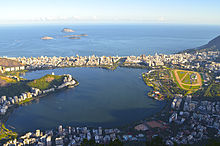



- Beaches in Rio de Janeiro
- Islands in Rio de Janeiro
- Lagoons in Rio de Janeiro
- Mountains in Rio de Janeiro
- Restingas in Rio de Janeiro
- Rivers in Rio de Janeiro
- Acari River
- Carioca River
- Maracanã River
Areas of Rio de Janeiro[]
- North Zone
- South Zone
- West Zone
- Zona Central
Districts of Rio de Janeiro[]
Neighbourhoods in Rio de Janeiro[]
Locations in Rio de Janeiro[]
- Tourist attractions in Rio de Janeiro
- Museums in Rio de Janeiro
- Shopping areas and markets
- World Heritage Sites in Rio de Janeiro
Aqueducts in Rio de Janeiro[]
Bridges in Rio de Janeiro[]
Cultural and exhibition centres in Rio de Janeiro[]


Forts in Rio de Janeiro[]
Monuments and memorials in Rio de Janeiro[]
Museums and art galleries in Rio de Janeiro[]
- Civil Police Museum
- Museu Aeroespacial
- Museu da Imagem e do Som do Rio de Janeiro
- Museu Nacional de Belas Artes
- Museum of Life
- Museum of Modern Art
- Museum of Tomorrow
- National Historical Museum
- National Museum of Brazil
Palaces and villas in Rio de Janeiro[]
- Catete Palace
- Paço de São Cristóvão
- Paço Imperial
- Palácio Laranjeiras
- Palácio Monroe
Parks and gardens in Rio de Janeiro[]
- Campo de Santana
- Flamengo Park
- Marapendi Municipal Nature Park
- Parque das Ruínas
- Parque Lage
- Passeio Público
- Pedra Branca State Park
- Quinta da Boa Vista
- Reserva de Marapendi
- Rio de Janeiro Botanical Garden
- Tijuca Forest
Public squares in Rio de Janeiro[]
Religious buildings in Rio de Janeiro[]
- Candelária Church
- Nossa Senhora do Monserrate do Rio de Janeiro
- Old Cathedral of Rio de Janeiro
- Presbyterian Cathedral of Rio de Janeiro
- Rio de Janeiro Cathedral
- Rio de Janeiro Brazil Temple
Secular buildings in Rio de Janeiro[]
- Edificio do Jornal A Noite
- Gustavo Capanema Palace
- Hanging Garden of Valongo
- National Observatory
- Petrobras Headquarters
- Rio Sul Center
- Torre Almirante
- Valongo Observatory
- Ventura Corporate Towers
Streets in Rio de Janeiro[]
- Avenida Atlântica
- Avenida Brasil
- Avenida Presidente Vargas
- Avenida Rio Branco
- Avenida Vieira Souto
- Rua General Urquiza
- Rua Tonelero
- Rua Uruguaiana
Theatres in Rio de Janeiro[]
Demographics of Rio de Janeiro[]
Demographics of Rio de Janeiro
Government and politics of Rio de Janeiro[]
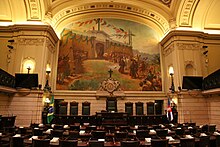
- Administrative Regions in Rio de Janeiro
- Mayors of Rio de Janeiro
- Municipal Chamber of Rio de Janeiro
- International relations of Rio de Janeiro
- Twin towns and sister cities of Rio de Janeiro
Law and order in Rio de Janeiro[]
- Law enforcement in Rio de Janeiro
- Civil Police of Rio de Janeiro State
- Military Police of Rio de Janeiro State
History of Rio de Janeiro[]


Carioca Square, Rio de Janeiro by Nicolas-Antoine Taunay. Museu Nacional de Belas Artes
History of Rio de Janeiro, by period or event[]
- Rio de Janeiro during the Portuguese Empire (1565–1815)
- São Sebastião do Rio de Janeiro founded by the Portuguese (1 March 1565)
- The colonial capital in Portuguese America is transferred to Rio de Janeiro from Salvador (27 January 1763)
- The city becomes capital of Kingdom of Portugal (1808)
- Rio de Janeiro during the United Kingdom of PBA (1815–1822)
- Rio becomes capital of the United Kingdom of Portugal, Brazil and the Algarves (1815)
- Rio de Janeiro during the Empire of Brazil (1822–1889)
- After the declaration of Brazil's independence in 1822, Rio de Janeiro becomes the capital of the new empire (1822–1889)
- Rio de Janeiro during the Republican period (1889–present)
- The city becomes capital of the republic of Brazil (1889)
- The Brazilian capital is officially moved to Brasília (21 April 1960)
- A presidential decree removes the city's federative status and merges it with the State of Rio de Janeiro, with the city of Rio de Janeiro replacing Niterói as the state's capital, and establishing the Rio de Janeiro Metropolitan Region (1975)
History of Rio de Janeiro, by subject[]
- Battle of Rio de Janeiro (1567)
- Battle of Rio de Janeiro (1711)
- Treaty of Rio de Janeiro (1825)
- Proclamation of the Republic (1889)
Culture of Rio de Janeiro[]


Culture of Rio de Janeiro
Arts in Rio de Janeiro[]
Architecture of Rio de Janeiro[]
- Buildings in Rio de Janeiro
- Tallest buildings in Rio de Janeiro
Cinema of Rio de Janeiro[]
Literature of Rio de Janeiro[]
Literature in Rio de Janeiro
- Writers from Rio de Janeiro
- Machado de Assis
- Paulo Coelho
Music of Rio de Janeiro[]


Music of Rio de Janeiro
- Music festivals and competitions in Rio de Janeiro
- Music venues in Rio de Janeiro
- Musical ensembles in Rio de Janeiro
- Musicians from Rio de Janeiro
- Oscar Lorenzo Fernández
- Heitor Villa-Lobos
- Songs about Rio de Janeiro
- Dance from Rio de Janeiro
- Maxixe
Theatre of Rio de Janeiro[]
Theatre in Rio de Janeiro
Visual arts of Rio de Janeiro[]



Rio de Janeiro in art / Paintings of Rio de Janeiro
- Imperial Academy of Fine Arts
- Escola Nacional de Belas Artes
- Public art in Rio de Janeiro
Events in Rio de Janeiro
Festivals in Rio de Janeiro
- Rio de Janeiro festivals
Languages of Rio de Janeiro
- Brazilian Portuguese
- Carioca
Media in Rio de Janeiro
People from Rio de Janeiro
- People from Rio de Janeiro
- Fernando Henrique Cardoso
- Paulo Coelho
- Oscar Niemeyer
- Nelson Piquet
- Ronaldo
Religion in Rio de Janeiro[]
Religion in Rio de Janeiro

| Religion | Percentage | Number |
| Catholic | 51.09% | 3,229,192 |
| Protestant | 23.37% | 1,477,021 |
| Irreligious | 13.59% | 858,704 |
| Spiritist | 5.90% | 372,851 |
| Umbanda and Candomblé | 1.29% | 72,946 |
| Jewish | 0.34% | 21,800 |
| Source: IBGE 2010.[1] | ||
Sports in Rio de Janeiro[]


- Football in Rio de Janeiro
- Association football in Rio de Janeiro
- Football teams in Rio de Janeiro
- Campeonato Carioca
- Association football in Rio de Janeiro
- Sports competitions in Rio de Janeiro
- Sports venues in Rio de Janeiro
Economy and infrastructure of Rio de Janeiro[]

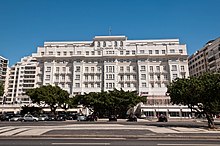

Economy of Rio de Janeiro
- Communications in Rio de Janeiro
- Financial services in Rio de Janeiro
- Hotels and resorts in Rio de Janeiro
- Shopping malls and markets in Rio de Janeiro
- Tourism in Rio de Janeiro
- Tourist attractions in Rio de Janeiro
Transportation in Rio de Janeiro[]

Public transport in Rio de Janeiro
- Air transport in Rio de Janeiro
- Airports in Rio de Janeiro
- Cable transport in Rio de Janeiro
- Maritime transport in Rio de Janeiro
- Road transport in Rio de Janeiro
- Buses in Rio de Janeiro
- Cycling in Rio de Janeiro
- Roads in Rio de Janeiro
Rail transport in Rio de Janeiro[]
Rail transport in Rio de Janeiro
- Corcovado Rack Railway
- Railway stations in Rio de Janeiro
 Rio de Janeiro Metro
Rio de Janeiro Metro
- SuperVia
- Trams in Rio de Janeiro
Education in Rio de Janeiro[]

Education in Rio de Janeiro
- List of Rio de Janeiro schools, colleges, universities and research centers
- Universities and colleges in Rio de Janeiro
- Federal University of Rio de Janeiro
- Rio de Janeiro State University
- Research institutes in Rio de Janeiro
- Instituto Nacional de Matemática Pura e Aplicada
- Oswaldo Cruz Foundation
See also[]
References[]
- ^ "Sistema IBGE de Recuperação Automática — SIDRA". Sidra.ibge.gov.br. Retrieved 11 October 2012.
External links[]
- Outlines of cities
- Wikipedia outlines
- Rio de Janeiro (city)
- Rio de Janeiro (city)-related lists





